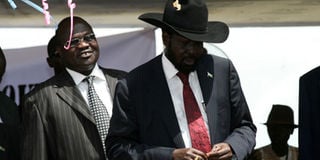It’s in Kenya’s interest to stop clashes in Juba

President of Southern Sudan, Salva Kiir (left) with the vice president Riek Machar during a rally at the John Garang Stadium in Juba, Southern Sudan, October 1st, 2010. PHOTO/STEPHEN MUDIARI
What you need to know:
- The scope of Kenya’s economic future has grown dramatically over the past decade and is tied irrevocably to the fortunes of its neighbours.
- One hopes that Kenyan diplomats expend as much energy with their counterparts in the EAC, IGAD and the AU seeking resolution of the crisis in South Sudan as they did about the ICC.
December has been a month of unexpected good news for the struggling economies of Europe.
After six years of recession and austerity, the green shoots of recovery can be seen from Greece in the southeast to Ireland in the northwest.
This is good news for the global economy and for some sectors of the Kenyan economy. Increased numbers of tourists and heightened demand for the country’s exports translate into jobs and wages for many in this country.
But the European recovery poses a challenge for Kenya and other surging African economies. As the economic crisis took hold in Europe and North America, investors seeking returns looked to emerging economies. In their effort to get any sort of return, investors were prepared to tolerate greater risk.
Big money can be made again in the developed economies where the political risks, in particular, are far less significant than in the developing world.
As governments in Europe start to loosen the purse strings and pursue investment in infrastructure, the likes of Kenya face a test to remain competitive.
There is much that can be done to ensure Kenya remains attractive to investors in a changing global economy. Reducing corruption, minimising the potential for future recurrence of political violence, and protecting the rule of law will help maintain foreign investment and improve the lives of all Kenyans too.
But it is unrealistic to expect any government to achieve solutions to such deeply entrenched problems over one or two terms of office. Some effort on all three counts would not go amiss, however.
A more realistic objective for the current government would be to take seriously Kenya’s role in the wider region. The potential influence of Kenyan diplomacy has been well demonstrated over the past few months in the campaign against the International Criminal Court.
The challenge now is to expend at least as much effort towards securing far more important foreign policy interests than just the freedom of two men.
As is well known, much of Kenya’s attractiveness to foreign investors comes from its position as a gateway to East and North East Africa.
It is the entry point into the EAC’s common market, host of vital infrastructure, a hub for regional road, rail and air routes, and the core of the region’s banking and technology sectors.
Over the past decade, Kenya has therefore benefited from a period of unprecedented political stability across the region. Only Somalia defied the regional trend towards peace and stability.
This peace and stability has allowed Kenya’s economic planners to draw up plans that envisage the country using its regional ties even more to accelerate economic growth.
No plan is grander than the Lamu Port-South Sudan-Ethiopia Transport Corridor (LAPSSET) project. As Mwai Kibaki remarked earlier this month, LAPSSET is ‘one of the best ways forward’ towards high growth.
It is, according to Kibaki, ‘Kenya’s biggest infrastructural undertaking ever’ and is designed to ‘increase trade between Kenya and her neighbours.’
But what is the new northern rail and road corridor if not accompanied by a pipeline carrying oil from South Sudan to Lamu?
This question has gained great potency over the past three weeks during the fighting between the warring factions of the SPLM.
Rightly, the Ministry of Foreign Affairs seems to have concentrated on the evacuation of Kenyan citizens from South Sudan before turning its attention to what role it can play in brokering some sort of peace deal.
At the time of writing talks were underway in Juba between President Salva Kiir, Ethiopia’s Prime Minister Hailemariam Desalegn and President Uhuru Kenyatta.
One hopes that Kenyan diplomats expend as much energy with their counterparts in the EAC, IGAD and the AU seeking resolution of the crisis in South Sudan as they did about the ICC.
Projects such as LAPSSET and possible future membership of South Sudan in the EAC have increased the importance of the country’s political contests to Kenya.
Moreover, perhaps greater regional cooperation with the peace effort in South Sudan will encourage some sort of discussion of the causes of conflict in the wider region.
Many of the causes of the ongoing bloodshed in South Sudan are somewhat exceptional due to the long history of conflict with Khartoum and within the SPLM.
However, others are shared with neighbours. Weak state institutions, ready access to arms, limited public confidence in government, a disregard for the human rights of citizens, a history of ethnic conflict, and the difficulty of integrating a resource-rich periphery are all shortcomings experienced in neighbouring states too, including Kenya.
The scope of Kenya’s economic future has grown dramatically over the past decade and is tied irrevocably to the fortunes of its neighbours.
Its needs a foreign policy to match if the country is to continue to attract the investment it needs for sustained economic growth.
Prof Branch teaches history and politics at Warwick University, UK [email protected]





